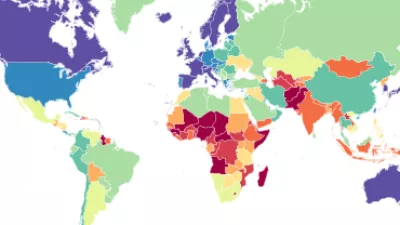News releases
Read the latest news from IHME about published research.Targets for avoidable sight loss ‘not being met’
Public health services across the world are failing to meet targets to reduce avoidable sight loss, according to a new study published today (1 December) in The Lancet Global Health.
The Lancet: One in three people worldwide could benefit from rehabilitation at least once in the course of their illness or injury, first global study estimates
As many as one in three people worldwide (2.41 billion people) could benefit from rehabilitation (such as physical and occupational therapy or speech and language therapy) at some point in their illness or injury, according to estimates published today in The Lancet in the first global study of its kind.
Norwegian Professors Jørn and Kristin Braa awarded 2020 Roux Prize
Professors and siblings Kristin Braa and Jørn Braa, of the University of Oslo, have been awarded the 2020 Roux Prize, a US$100,000 award for turning evidence into health impact. The siblings created and manage the District Health Information Software 2 (DHIS2), an open-source tool that is now the world’s largest health management information platform.
Tabba Heart Institute and Institute for Health Metrics and Evaluation Collaborate to Improve Cardiovascular Health in Pakistan
Tabba Heart Institute (THI) and the Institute for Health Metrics and Evaluation (IHME) at the University of Washington’s School of Medicine are partnering to improve public knowledge and inform policymakers of cardiovascular health in Pakistan by collecting and sharing data, leveraging their expertise in health metrics sciences to provide more accurate estimates of the national and provincial burden of cardiovascular diseases in Pakistan.
Nature Medicine: Universal US mask wearing could save nearly 130,000 lives by the end of February 2021
More than a half million lives could be lost to COVID-19 by 28 February 2021 in the USA, suggests a modeling study published in Nature Medicine. The paper also estimates that universal mask use could prevent the worst effects of epidemic resurgences in many states and could save nearly 130,000 of those half million lives.
The Lancet: Latest global disease estimates reveal perfect storm of rising chronic diseases and public health failures fuelling COVID-19 pandemic
Most comprehensive global study—analysing 286 causes of death, 369 diseases and injuries, and 87 risk factors in 204 countries and territories—reveals how well the world’s population were prepared in terms of underlying health for the impact of the COVID-19 pandemic.
Newly announced federal grant supports Safe Start projects and partnerships aimed at helping Washington state businesses restart, rebuild and become more resilient
In support of the state’s Safe Start efforts, the Washington State Department of Commerce spearheaded a unique collaboration among public, private and philanthropic organizations to help keep small businesses open, protect and create jobs, while also looking ahead to strengthen key sectors in the future.
Modifiable Health Risks Linked to more than $730 Billion in US Health Care Costs
Modifiable health risks, such as obesity, high blood pressure, and smoking, were linked to over $730 billion in in health care spending in the US in 2016, according to a study published in The Lancet Public Health.
First COVID-19 Global Forecast: IHME Projects Three-Quarters of a Million Lives Could be Saved by January 1
In the first global projections of the COVID-19 pandemic by nation, the Institute for Health Metrics and Evaluation (IHME) at the University of Washington’s School of Medicine is predicting nearly 770,000 lives worldwide could be saved between now and January 1 through proven measures such as mask-wearing and social distancing.
COVID-19 in India: New Forecast Shows Opportunity to Prevent More Than 200,000 Deaths by December 1
New modeling of the COVID-19 pandemic in India shows that while the disease will continue to pose a major public health threat, it may be possible to prevent more than 200,000 deaths by December 1, 2020, with widespread mask use and data-driven social distancing measures in the most affected states. The modeling, produced by the Institute for Health Metrics and Evaluation (IHME) at the University of Washington, suggests that there is an opportunity to further limit the toll of COVID-19 in India and highlights the critical need for people to comply with face mask use, social distancing, and other COVID-19 prevention guidelines as advised by public health authorities.
New evaluation of universal health coverage shows that the world will likely fall short of World Health Organization goal
A new study projects that 3.1 billion people will still lack effective health service coverage in 2023, with 968 million of those residing in South Asia. This falls short of the World Health Organization (WHO) goal of 1 billion more people benefiting from universal health coverage (UHC) between 2019 and 2023.
New IHME COVID-19 Forecasts for Sub-Saharan Africa Find Mask-wearing and Other Prevention Measures Could Prevent Over 60,000 Deaths by December 1
In new COVID-19 projections for sub-Saharan Africa, the Institute for Health Metrics and Evaluation (IHME) at the University of Washington forecasts that nearly universal adherence to mask-wearing and social distancing mandates in hard-hit countries could prevent up to 60,125 deaths in the region by December 1.
New IHME COVID-19 Forecasts See Nearly 300,000 Deaths by December 1
America’s COVID-19 death toll is expected to reach nearly 300,000 by December 1; however, consistent mask-wearing beginning today could save about 70,000 lives, according to new data from IHME.
New IHME COVID-19 Forecasts for Ethiopia Show Nearly 8,000 People Dying by November 1, But Mask Usage Could Reduce Deaths by 65%
The Institute for Health Metrics and Evaluation (IHME) at the University of Washington is forecasting 7,872 people (with a range of 1,115 to 31,971) will die from COVID-19 in Ethiopia by November 1, if the country continues to ease social distancing policies.
A third of the world’s children poisoned by lead, new groundbreaking analysis says
Lead poisoning is affecting children on a massive and previously unknown scale, according to a new report launched today by UNICEF and Pure Earth.














